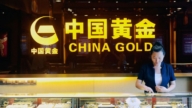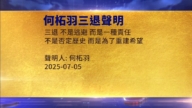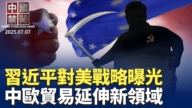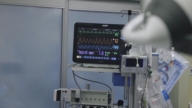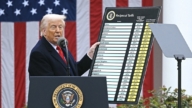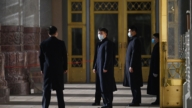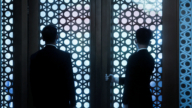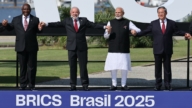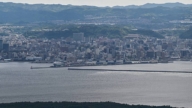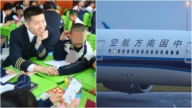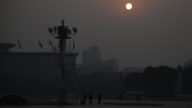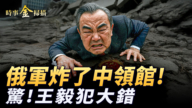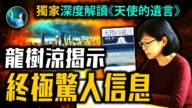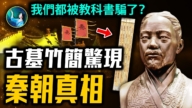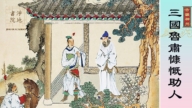【新唐人2013年01月11日讯】中国新一届政府将启动“大部制改革”。而“大文化部”及“大交通运输部”将率先起步。这项方案是不是能达到所谓精兵简政,改善政出多门,提高行政效率,降低行政成本等﹖或者如专家预测,只是“换汤不换药”!接下来请和本台记者一起去了解。
《路透社》1月9号报导,跟据两位来自北京官方的消息人士透露,中国新一届政府将启动大部制改革,而最先实行大部制改革的领域,主要有“大文化部”,打算将“新闻出版总署”和“国家广电总局”并入到文化部;其次是实行“大交通运输部”,将“铁道部”并入到交通运输部。
大陆专家预测,大部制改革方案可能在两会过后出台。
“大部制”是指在政府的部门设置中,将那些职能相近的部门、业务范围趋同的事项相对集中,由一个部门统一管理,最大限度的避免政府职能交叉、政出多门、多头管理,从而提高行政效率,降低行政成本。
2008年3月11号,大陆国务院公布大部制改革,整合组建五部委,包括:工业和资讯化部、人力资源和社会保障部、住房和城乡建设部、交通运输部、环境保护部。
原资深记者的大陆作家铁流向《新唐人》表示,现在主管新闻、出版及传播的单位是“中宣部”,但这之前却是文化部的领域。
大陆作家 铁流:“过去文化部管新闻、管出版、管广电,最后分出去,单独成立变成一个部委,多增加一个部长,多增加一个人员。”
香港《动向》杂志主编 张伟国:“每一次改革,他们本身的一个宗旨,或是对外宣传的一个标准,都是为了精兵简政、提高效率,但结果都是…这个部门越改越多,而不是越改越少,吃皇粮的也是越改越多。”
稍早前,有关大部制改革的核心问题,大陆专家已经提出:这不是简单的部门、权力整合,应该伴随对政府权力的约束和分权,厘清政府权力的边界,防止权力集中带来的腐败。
铁流:“现在又回去了,文化部又变大了,权力就变大了。但是铁道部一直以来都是个独立单位的。(现在)归交通部管,就把权力削弱了。管新闻、管出版就是中宣部,不是文化部,也不是出版总署。”
张伟国:“中国不是要并这些部,关键是要撤掉宣传部!如果这个(宣传部)不撤掉的话,那下面变来变去,都是换汤不换药!今天可以变成部,明天可以变成总局,后天可以变成一个什么委员会,甚至于领导小组。”
香港《动向》杂志主编张伟国还表示,在中国,党和军队以及政府关系没有分清楚之前,说要把铁道部并到交通运输部去,可能造成尾大不掉的后果。
张伟国:“现在党搞一套机制,政府里面搞一套,然后军队系统自己也有一套,各搞各的,如果这些各自为政的局面不改变,巨大的这种利益集团就可以绑架整个体制,最后像这种所谓的改革,就会变成换汤不换药,骗骗老百姓而已。”
此外,《路透》引述消息人士的话还提到,一些涉及政府监管市场的职能出现交叉错位,也需要将相关部门合并到大的监管部门中,有利于更好的发挥政府监管市场的作用。
而专家认为,大部制也要根据市场经济发展的要求,按照市场经济原则简并和优化机构设置,把“转变政府职能”作为核心任务。
张伟国则说,最关键的核心是实行政治体制改革,让党政分开,然后政府向立法部门负责,接受舆论和社会的监督,政府接受立法部门的制约。
采访/陈汉 编辑/周平 后制/萧宇
Chinese Communist Party Regime “Large Ministry Reform”
The new Chinese Communist Party (CCP)
administration shall stage a “big-ministry reform”.
It will embark on setting up a large Ministry
of Culture and large Ministry of Transport.
Will this scheme improve efficiency
and lower administrative costs?
Or will it be what the experts have
predicted; ‘old wine in a new bottle’?
On January 9, Reuters reported news
from sources inside the Beijing regime.
It said that the new CCP administration
will restructure its central departments.
The change will kick off with
creation of a large Culture Ministry.
It will consolidate the General Administration
of Press & Publication, and the State
Administration of Radio, Film & Television.
Following this, it will establish a large
Ministry of Transport, which will
incorporate the Ministry of Railways.
China’s expert speculated that this program of reform will
be released after the CCP Two Sessions held this March.
The term “large Ministry” refers to centralized management
of government departments that have similar functions.
It aims to increase efficiency and lower administrative costs.
In March 2008, the CCP State Council announced
the creation of five centralized ministries.
These were: Industry & Information Ministry,
Human Resources & Social Welfare Ministry,
Housing & Urban-Rural Construction Ministry,
the Ministry of Transport and
Environmental Protection Ministry.
Tie Liu, a former media worker, says that currently,
the CCP’s Central Propaganda Department is in
charge of press, publication & mass communication.
Prior to that, it was under the administration
of the Ministry of Culture.
Tie Liu: “In the past, the Ministry of Culture
supervised print media, radio, film & television.
Later it was separated, and media
control became a separate department.”
Zhang Weiguo, Chief Editor, Trend magazine in Hong Kong:
“The slogan of each CCP reform is always ‘for efficiency’.
But as a result, more departments have
been set up, and with more civil servants.”
Previously, China’s experts have commented
on the core issue of large ministry reforms.
They said that this shouldn’t be a simple
restructuring and consolidation of power.
It should synchronize checks and balances, so as to
prevent corruption caused by the concentration of power.
Tie Liu: “Now the regime takes a step back by expanding
the Ministry of Culture and give it more authority.
The Ministry of Railways has long
been an independent department.
Now it’s put under administration of the
Ministry of Transport, with weakened power.
The Central Propaganda Department still
takes charge of press and publications.”
Zhang Weiguo: “The real goal is not consolidation of these
departments, but to axe the Propaganda Department.
Without taking down the leadership of this Department,
everything remains the same, with changes in name only.”
Zhang Weiguo adds that if there’s no strict segregation
among the Party, the army and the government, the
merging of the Railways Ministry into the Ministry
of Transport may cause a resulting difficulty in control.
Zhang Weiguo: “Now the Party has its own operating
mechanism, as do the government and army.
If such a lack of coordination remains unchanged,
certain invested groups would control the whole system.
Then the alleged reforms will be ‘old wine in
a new bottle’, just used to fool the general public.”
The sources said some functions of the governments
regulation of the marketplace has overlapped.
Consolidation of the relevant departments into
a large superior administrative organ will play
its role better, according to the Reuters report.
Experts propose that under the principle of integration
and optimization, the large ministry system
will prioritize transformation of government functions.
Zhang Weiguo comments that the core issue
shall be implementation of political reform.
Separating the Party from the government, and placing
the government under a watchdog of a legislative
department, as well as the media and public.


